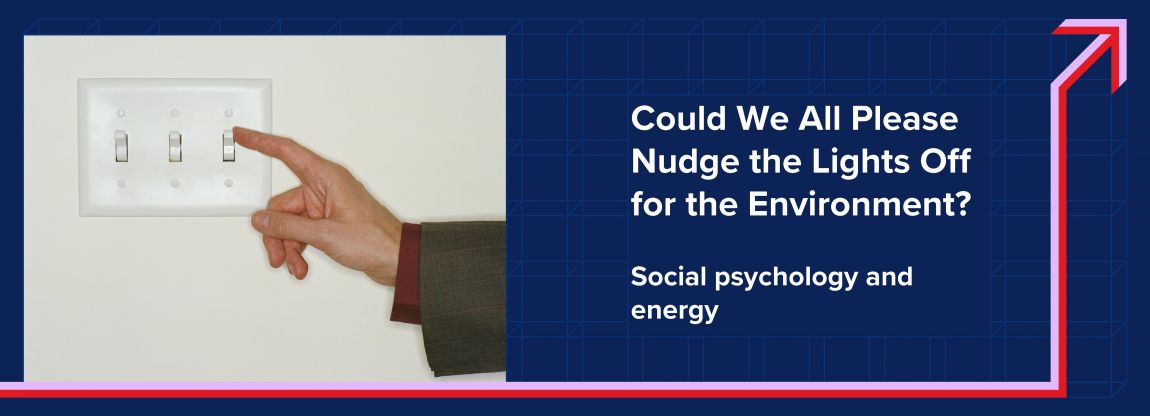Could We All Please Nudge the Lights Off for the Environment? Social Psychology and energy
Put the words ‘energy prices 2022’ into a Google search and the results declare unwelcome news for our wallets. The emphasis is very much on the soaring cost of gas and electricity. According to the European Commission, energy prices increased in 16 EU Member States during the first six months of 2021. Other countries including the UK, the US, and Australia have also seen their energy bills skyrocket. In the UK, the media and charities have coined the catchphrase “the choice between heating and eating” to characterise the dilemma facing people struggling to meet these rising costs. Suggested solutions range from increasing production of gas and electricity to reduce costs, reducing government taxes on our bills and cutting green levies. Green levies are additional costs added to our energy bills which is invested into renewable ‘greener’ energy sources (Bradshaw, 2022). But wait a minute: what has this got to do with social psychology? Well, quite a lot as it happens!
Social psychologists have been interested in energy-use since the 1970s.
We make choices about who supplies our energy, whether we use gas and/or electricity or something else, whether we should turn the heating on, how to cook our food, plug in the laptop, and whether to turn the light on – or remember to turn it off!
These choices are behaviours driven by concerns and practicalities such as cost, efficiency, and our attitudes towards types of energy and suppliers.
The good news for social psychologists is that these attitudes and behaviours also point us towards how they can be influenced and changed.
Social psychologists have been interested in energy-use since the 1970s.


Some of the earlier work looked at how we can persuade people to conserve energy in their homes (e.g., turning those lights off). Detailed analyses of the incentives and barriers to behavioural change have offered some interesting and surprising insights. Much of this centred around the attitude-behaviour relationship.


For example, increasing people’s knowledge about energy and impact on the environment, the influence of our peers, and the promotion of a positive pro-environment identity communicated effectively, can all stimulate small behavioural changes embedded into our individual routine habits (see Pallak & Cummings, 1976, or Gonzales et al., 1988 for interesting examples).
After all, what would the neighbours think if we didn’t keep up with the pro-environmental habits of the rest of the neighbourhood?
We need what the behavioural economists call a ‘nudge’ on a global scale, to make environmentally friendly choices.
Since the 1970s, our environment has changed quite dramatically. As climate change, pollution and decreasing biodiversity are just a handful of the environmental challenges that now impact on our everyday lives, psychological research has increasingly focused on the bigger global picture.
Writing for the American Psychologist in 2000, Paul Stern declared the vital role psychology must play in understanding and changing human behaviour to mitigate environmental degradation. And small individual behavioural changes alone won’t meet the challenge.
We need world-wide collective behavioural and attitudinal change. We need what the behavioural economists call a ‘nudge’ (Thaler & Sunstein, 2009) on a global scale, to make environmentally friendly choices.
But faced with lots of choices, will we choose the right ones for the environment?
This is tricky when the choices that would benefit the environment, and indeed all of us, negatively impact upon us as individuals.
This is what Hardin (1968) termed the Tragedy of the Commons. Whether the resource is water, food, gas, oil, electricity, or land, as individuals we all want as much of it as we can get to make our lives as comfortable as possible.
However, this inevitably means that those with the best access will reap most of the resource, at the expense of others. Furthermore, we risk depleting the resource completely. In benefitting ourselves, we negatively impact on the collective (others).


Asking us to reduce our use of a resource, is never going to be a popular idea. Price hikes for our energy-use may nudge us away from the behavioural choices we routinely make.
We are truly all in this together
However, whilst we might assume that soaring costs will force our hand when it comes to energy-use, psychological research tells us that’s only part of the story.


If we are to tackle rising energy costs and wider environmental challenges long-term, we will need to identify, think, and act as a collective, with shared pro-environmental norms and values that nudge us all into behavioural change (Barth et al., 2021).
Pro-environment choices should be the default option and attractive – not the optional extra and burden.
But most importantly they must promote a strong sense of collective belonging and responsibility for a global community of human and non-human animal-kind.
That is the global nudge required because we truly are all in this together.
In the most recent edition of Social Psychology we explore social psychology and how it can be applied to environmental norms and sustainability. You can buy your copy here if you are interested in learning more.

